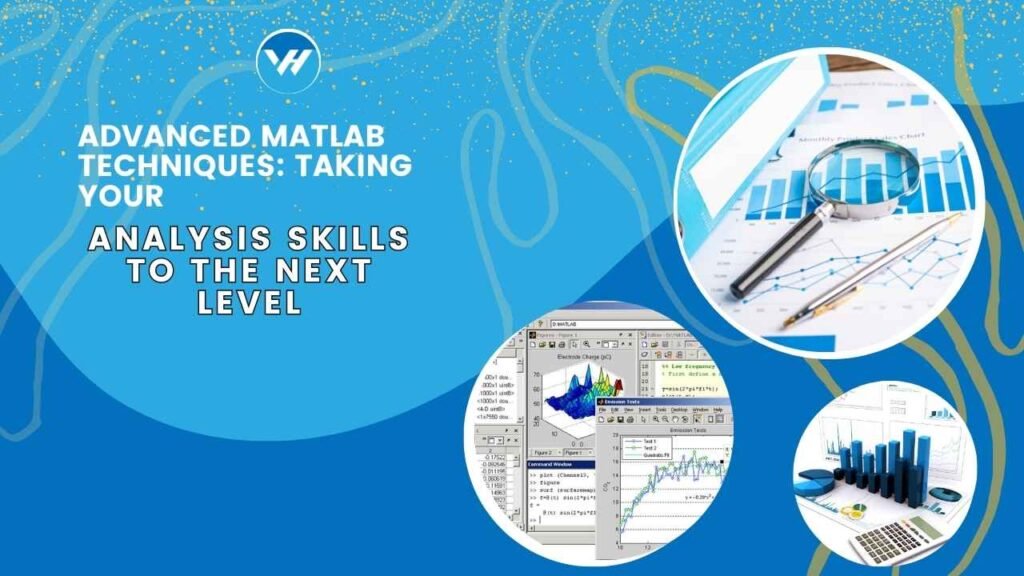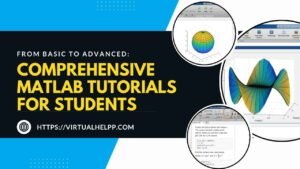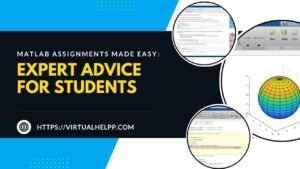Welcome to the world of advanced MATLAB techniques! If you’re a student or professional diving deep into data analysis and computational modeling, you already know MATLAB is a powerful tool. But how do you push your skills beyond the basics? This article will guide you through advanced MATLAB features and techniques to elevate your analysis skills and make your data work for you.

Table of Contents
ToggleUnderstanding Advanced MATLAB Features
Complex Data Types
MATLAB’s strength lies in its ability to handle various data types. Mastering complex data structures like arrays, matrices, structures, and cell arrays can significantly enhance your analytical capabilities.
- Arrays and Matrices: While basic operations on arrays and matrices are essential, advanced techniques involve manipulating multidimensional arrays, leveraging sparse matrices, and using matrix factorization methods to solve complex problems.
- Structures and Cell Arrays: Structures and cell arrays offer flexibility in handling diverse data types. They allow you to group related data of different types, making it easier to manage and analyze complex datasets.
Advanced Mathematical Functions
MATLAB provides robust toolboxes for advanced mathematical operations.
- Symbolic Math Toolbox: This toolbox enables you to perform algebraic calculations symbolically, rather than numerically. You can solve equations, perform calculus operations, and simplify expressions, which is especially useful for theoretical analysis.
- Optimization Toolbox: For solving complex optimization problems, this toolbox offers various algorithms for finding the best solutions, whether you’re working on linear programming, quadratic programming, or nonlinear optimization.
Custom Functions and Scripts
Creating custom functions and scripts can streamline your workflow and make your code more modular.
- Creating Reusable Functions: Functions allow you to encapsulate code into reusable blocks, making your scripts cleaner and easier to maintain. Learn how to define functions with multiple inputs and outputs to tackle different tasks efficiently.
- Script Organization and Debugging: Effective script organization and debugging practices are crucial. Use MATLAB’s debugging tools, such as breakpoints and the command window, to troubleshoot and refine your code.
Data Visualization Techniques
Advanced Plotting Functions
Visualizing data effectively can reveal insights that raw numbers might obscure.
- 3D Plots and Surface Graphs: Explore MATLAB’s capabilities for creating intricate 3D plots and surface graphs. These visualizations are particularly useful for understanding complex relationships in multidimensional data.
- Interactive Plots: Enhance user interaction with your plots using MATLAB’s interactive plotting features. Adding buttons, sliders, and interactive legends can make your visualizations more engaging and informative.
Customizing Plots
Tailoring your plots to highlight specific data aspects can improve clarity.
- Annotations and Labels: Use annotations and labels to add context to your plots. This includes titles, axis labels, and data point markers that provide more information about your visualized data.
- Plot Styles and Colors: Experiment with different plot styles and colors to make your data stand out. MATLAB offers extensive customization options to ensure your plots are not only functional but also visually appealing.
Efficient Data Analysis Methods
Data Preprocessing
Before diving into analysis, proper data preprocessing is essential.
- Handling Missing Data: Learn techniques for dealing with missing or incomplete data. Methods such as imputation and interpolation can help maintain the integrity of your dataset.
- Data Normalization and Transformation: Normalize and transform data to ensure consistency and improve the performance of your analytical models. This can involve scaling, log transformations, or other preprocessing steps.
Statistical Analysis
MATLAB provides various tools for in-depth statistical analysis.
- Regression Analysis: Perform linear and nonlinear regression to model relationships between variables. MATLAB’s built-in functions make it easy to fit models and assess their accuracy.
- Hypothesis Testing: Conduct hypothesis tests to draw conclusions from your data. MATLAB offers functions for t-tests, ANOVA, and other statistical tests to validate your hypotheses.
Leveraging MATLAB for Machine Learning
Machine Learning Toolbox
MATLAB’s Machine Learning Toolbox brings advanced algorithms to your fingertips.
- Supervised Learning Techniques: Implement classification and regression algorithms to train models using labeled data. Explore techniques like decision trees, support vector machines, and neural networks.
- Unsupervised Learning Techniques: Discover patterns in unlabeled data with clustering and dimensionality reduction methods. Algorithms like k-means clustering and principal component analysis (PCA) are essential tools.
Implementing and Tuning Models
Fine-tuning models is crucial for achieving optimal performance.
- Model Training and Validation: Learn how to split your data into training and validation sets, ensuring that your models generalize well to new data.
- Hyperparameter Tuning: Adjust model parameters to enhance performance. MATLAB provides tools for systematic hyperparameter optimization to find the best settings for your models.
Parallel Computing and Performance Optimization
Parallel Computing Toolbox
Boost your computational efficiency with MATLAB’s parallel computing capabilities.
- Parallel Loops and Data Processing: Utilize parallel loops to speed up repetitive computations. The Parallel Computing Toolbox allows you to distribute tasks across multiple processors or cores.
- GPU Computing: Leverage GPU acceleration for intensive computations. MATLAB supports GPU computing to handle large-scale problems more efficiently.
Performance Optimization Techniques
Optimizing your code can lead to significant performance improvements.
- Code Profiling: Use MATLAB’s profiler to identify bottlenecks in your code. Profiling helps you focus on optimizing the most time-consuming parts of your scripts.
- Efficient Algorithm Design: Design algorithms with efficiency in mind. Implementing vectorized operations and avoiding unnecessary loops can enhance performance.
Integrating MATLAB with Other Tools
MATLAB and Simulink Integration
Combine MATLAB with Simulink for a comprehensive simulation environment.
- Co-Simulation Techniques: Synchronize MATLAB and Simulink models for co-simulation. This integration is useful for complex systems where MATLAB handles data analysis and Simulink manages dynamic simulations.
- Data Exchange between MATLAB and Simulink: Seamlessly transfer data between MATLAB and Simulink to streamline your workflow. Use data exchange methods to integrate results from both environments.
Connecting MATLAB with External Databases
MATLAB’s database connectivity features allow you to work with external data sources.
- Database Connectivity: Connect to databases using MATLAB’s database toolbox. This enables you to query and manipulate data directly from your database within MATLAB.
- Data Import and Export: Import and export data between MATLAB and various formats (e.g., CSV, Excel). This flexibility ensures you can work with data from different sources efficiently.
Real-World Applications and Case Studies
Engineering Applications
MATLAB’s advanced techniques are widely used in engineering fields.
- Control Systems Design: Design and analyze control systems using MATLAB’s advanced tools. Simulate and optimize control strategies for better system performance.
- Signal Processing: Apply advanced signal processing techniques to analyze and filter signals. MATLAB’s toolbox offers powerful functions for working with time-series data and frequency analysis.
Scientific Research Applications
In scientific research, MATLAB’s capabilities are invaluable for data analysis and modeling.
- Data Analysis in Experiments: Use MATLAB for analyzing experimental data. Apply statistical methods and visualize results to draw meaningful conclusions from your research.
- Computational Modeling: Develop computational models to simulate complex phenomena. MATLAB’s robust environment supports modeling across various scientific domains.
Conclusion
Mastering advanced MATLAB techniques can significantly enhance your analysis skills and broaden your capabilities. By leveraging complex data types, advanced mathematical functions, and powerful visualization tools, you can tackle more sophisticated problems and achieve deeper insights. Whether you’re working on engineering projects, scientific research, or machine learning, these techniques will elevate your MATLAB proficiency.
If you’re looking for more personalized guidance or need help with specific MATLAB challenges, consider exploring Virtual Help’s iOS and Android apps. With access to expert tutors and tailored assignment help, you can take your MATLAB skills to the next level with confidence.
FAQs
- What are the most essential MATLAB toolboxes for advanced analysis?
- Essential toolboxes include the Symbolic Math Toolbox, Optimization Toolbox, Machine Learning Toolbox, and Parallel Computing Toolbox. These provide advanced functions for mathematical computations, optimization, machine learning, and parallel processing.
- How can I improve my MATLAB coding skills effectively?
- Practice regularly, explore MATLAB’s extensive documentation, and take advantage of online tutorials and courses. Engaging with community forums and seeking feedback on your code can also accelerate your learning.
- What are some common challenges faced with MATLAB’s advanced features?
- Common challenges include managing complex data types, optimizing code performance, and debugging sophisticated algorithms. Leveraging MATLAB’s built-in tools and seeking assistance from experts can help overcome these hurdles.
- How can Virtual Help assist with MATLAB learning and troubleshooting?
- Virtual Help offers personalized tutoring and assignment assistance through its iOS and Android apps. Expert tutors can guide you through advanced MATLAB techniques, troubleshoot issues, and provide tailored support to enhance your learning experience.
- Are there any recommended resources for learning advanced MATLAB techniques?
- Recommended resources include MATLAB’s official documentation, online courses from platforms like Coursera and edX, and textbooks focusing on advanced MATLAB applications. Engaging in practical projects and case studies can also provide hands-on experience.





